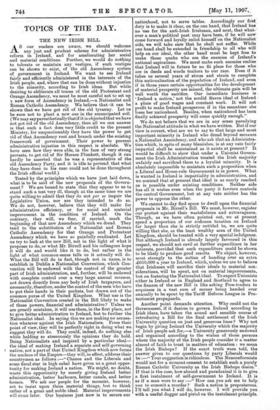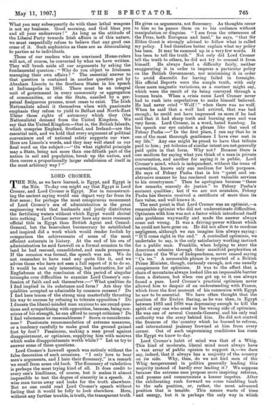TOPICS. OF THE DAY.
THE NEWIRISH BILL.
AS our readers are aware, we should welcome any juit and prudent scheme for administrative reform in Ireland, and' for ameliorating her social and material conditions. Further, we would do nothing to, tolerate or maintain any vestiges, if such vestiges can be shown to exist, of the old Ascendency system of government in Ireland. We want to see Ireland fairly and efficiently administered in the interests of the Irish people, and, where that can be done without injustice to the minority, according to Irish ideas. But while desiring to obliterate all traces of the old Protestant and Orange Ascendency, we must be most careful not to set up
a new form of Ascendency in Ireland,—a Nationalist and Roman Catholic Ascendency. We believe that •it can be shown that we have got rid of the old tyranny. Let us be sure not to plant a new one in the emancipated soil. (We may say parenthetically thatif it is objected that we have not got rid of the old Ascendency, then all we can answer is that such a fact does very little credit to the present Ministry, for unquestionably they have the power to get rid of that Ascendency root and branch under the existing framework of government. Their power to prevent administrative injustice in this respect is absolute. We have seen how they were able, in the face of very strong protests, to get rid of Sir Horace Plunkett, though it can hardly be asserted that he was a representative of the old Ascendency Party, and it is idle to pretend that what they have done in his case could not be done throughout the Irish official world.) Tested by the principles which we have just laid down, what is to be said of the new proposals of the Govern- ment ? We are bound to state that they appear to us to stand such a test very ill, though at the same time we are quite willing to admit that they do not per se impair the Legislative Union, nor are they intended to do so. We do not, however, believe that they will make for administrative efficiency, or for social and material improvement in the condition of Ireland. On the contrary, they will, we fear, if carried, mark the beginning of that new Ascendency which we dread. They tend to the substitution of a Nationalist and Roman Catholic Ascendency for that Orange and Protestant Ascendency which we have so painfully eradicated. Let us try to look at the new Bill, not in the light of what it proposes to do, or what Mr. Birrell and his colleagues hope it will do and would like it to do, but rather in the light of what common-sense tells us it actually will do. What the Bill will do in fact, though not in name, is to establish in Dublin a Nationalist Convention, which Con- vention will be endowed with the control of the greater part of Irish administration, and, further, will be endowed with complete control over a very large annual revenue, not drawn directly from any body of Irish taxpayers, and necessarily, therefore, under the control of the men who have to put their hands in their pockets, but drawn out of the common purse of the United Kingdom. What use is the Nationalist Convention created in the Bill likely to make of these powers, financial and administrative? Unless we are greatly mistaken, it will use them, in the first place, not to give better administration to Ireland, but to further the Nationalist ideal. In saying this we are making no accusa- tion whatever against the Irish Nationalists. From their point of view, they will be perfectly right in doing what we
suggest they will they They could, indeed, do nothing else while holding so strenuously the opinions they do hold. Being Nationalists and inspired by a particular ideal— the ideal of making Ireland a separate and self-governing
0 nation, not a part of that United Kingdom which now forms the nucleus of the Empire—they will, in effect, address their countrymen as follows :—" Chance and the Liberals and some fiscal star in high cabal have given us a great oppor- tunity for making Ireland a nation. We might, no doubt, waste this opportunity by merely giving Ireland better, administration, better harbours, better canals, and better houses. We ask our 'people for the moment, however, not to insist upon, material things, but to think rather of a great an noble ideal. Material improvements will come later. Onr business just now is to secure our
nationhood, not to serve tables. Accordingly our &it duty is to make it clear, on the one hand, that Ireland has uo use for the anti-Irish Irishman, and next, that what- ' ever a man's political past-may have been, if he will now' come forward and loyally enlist himself on the Nationalist side, we will take care that he shall not suffer. While one hand shall be extended in friendship to all who will help on our ideal, the other hand' must be kept free to make those quake who are the enemies of Ireland's national aspirations. We must make such enemies realise that Ireland will in future be no fit place for those who are in deeds and words traitors to our race. Even if it takes us several years of stress and strain to complete this nationalisation of the population of Ireland, and even ' if in those years certain opportunities for the development of material prosperity are missed, the ultimate gain will be well worth the sacrifice. Our immediate business is • 'Ireland a nation,' not the sordid Saxon ideal of Ireland a place of good wages and constant work. It will not profit to make Ireland prosperous if in the meantime she loses her nationhood. Besides, when nationhood has been finally achieved prosperity will come quickly enough."
We do not believe that we are in any sense parodying the Nationalist attitude in what we have written. But if our view is correct, what are we to say to that large and most important minority in Ireland who dread beyond measure a Nationalist Ascendency, and who ask that an Admiuistra- tion which, in spite of many blemishes, is at any rate fairly impartial shall be maintained as it exists at present? It would be difficult to show that under a Unionist Govern- ment the Irish Administration treated the Irish majority unfairly and sacrificed them to a loyalist minority. It is absolutely impossible to maintain such a proposition when a Liberal and Home-rule Government is in power. What is wanted in Ireland is impartiality in administration, and we contend that at present that ideal is as nearly reached as is possible under existing conditions. Neither side has all it wishes even when the party it favours controls the central Government., but at any rate neither has the power to oppress the other.
We cannot to-daY find space to dwell upon the financial proposals in Mr. Birrell's Bill. We must, however, register our protest against their wastefulness and extravagance. Though, as we have often pointed out, we at present spend a proportion of our codunon taxation on Ireland far larger than she is strictly entitled to, we are quite willing that she, as the least wealthy area of the United Kingdom, should be treated with a very special indulgence. But although Ireland is already largely favoured in this respect, we should not cavil at further expenditure in her interests, provided that such expenditure could be shown to be likely to produce good results. We object, however, most strongly to the notion of handing over an extra £650,000 a year to Ireland, which, unless we are to believe that Irishmen will sacrifice their ideals to material con- siderations, will be spent, not on material improvements, but on fostering the Nationalist ideal. To expect Unionists either in Ireland or in England and Scotland to agree to the finance of the new Bill is like asking Free-traders to acquiesce in a vast sum of money being handed over annually to be spent by the Tariff Reform League in Pro- tectionist propaganda.
Another point demands attention. Why could not the Government, if it desires to govern Ireland according to Irish ideas, have taken the sound and sensible course of introducing a Bill for the final settlement of the Irish University question on just and generous lines ? Why not begin by giving Ireland the University which the majority of Irish people ask.for,—a University generously endowed and organised according to the wishes of those persons whom the majority of the Irish people consider it a matter almost of faith to trust in matters of education : we mean the Irish Bishops ? If the exact truth were told, the answer given to our questions by party Liberals would be :—" Your suggestion is ridiculous. The Nonconformists would not for a moment consent to establish such a purely Roman Catholic University as the Irish Bishops desire." If that is the case, how absurd and paradoxical it is to give , a first instalment of self-government, to Ireland. It is as if a man were to say :—" How can you ask me to help, you to commit a murder? Such a notion is preposterous. I'll tell you what I will do, however. I' will provide you , with a useful dagger and pistol on the instalment principle.
What you may subsequently do with these lethal weapons is not. my business. Good morning, and God bless you and all your endeavours ! " As long as the attitude of the Liberal Party towards Irish affairs is of this nature, we must respectfully refuse to believe that any good can come of it. , Such sophistries as these are as demoralising to parties as to individuals.
Those of our readers who are convinced Home-rulers will not, of course, be converted by what we have written. They will :brush aside all our arguments by asking the fundamental question : " Why do you object to Irishmen managing their own affairs ? " The essential answer to that question is contained in another question put by Abraham. Lincoln to the Southern States in his speech at Indianapolis in 1861. There must be an integral unit of government in every community or aggregation of communities, or else the State, assailed by a. per- petual fissiparous process, must cease to exist. The Irish Nationalists admit it themselves when with passionate emphasis they refuse to yield to Belfast and North-East Ulster those rights of autonomy which they (the Nationalists) demand from the United Kingdom. We say that the United Kingdom—that is, the British Islands, which comprise England, Scotland, and Ireland—are the essential unit, and we hold that every argument of political convenience and of national safety supports our view. Here are Lincoln's words, and they may well stand as our final word on the subject:—" On what rightful principle may a State, being not more than one-fiftieth part of the nation in soil and population, break up the nation, and then coerce a proportionally larger subdivision of itself in the moat arbitrary way ? "











































 Previous page
Previous page